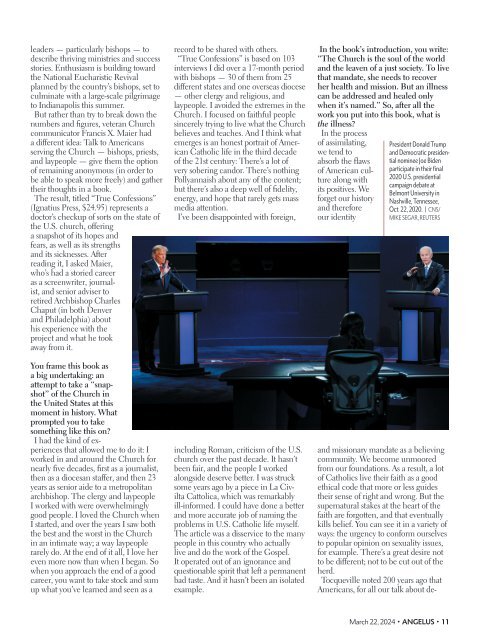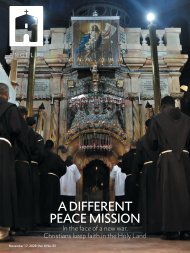Angelus News | March 22, 2024 | Vol. 9 No. 6
On the cover: To cap off a nearly five-decades-long career working in Church communications, Francis X. Maier had an ambitious book idea: a ‘snapshot’ of the Church in America at this time in history that captured both its strengths and its sicknesses. On Page 10, Maier shares what he took away from hearing more than 100 “confessions”’ with American Catholic leaders for the project. On Page 20, John L. Allen Jr. offers his own diagnosis of the uneasy relationship between U.S. Catholics and Rome during the Pope Francis pontificate.
On the cover: To cap off a nearly five-decades-long career working in Church communications, Francis X. Maier had an ambitious book idea: a ‘snapshot’ of the Church in America at this time in history that captured both its strengths and its sicknesses. On Page 10, Maier shares what he took away from hearing more than 100 “confessions”’ with American Catholic leaders for the project. On Page 20, John L. Allen Jr. offers his own diagnosis of the uneasy relationship between U.S. Catholics and Rome during the Pope Francis pontificate.
You also want an ePaper? Increase the reach of your titles
YUMPU automatically turns print PDFs into web optimized ePapers that Google loves.
leaders — particularly bishops — to<br />
describe thriving ministries and success<br />
stories. Enthusiasm is building toward<br />
the National Eucharistic Revival<br />
planned by the country’s bishops, set to<br />
culminate with a large-scale pilgrimage<br />
to Indianapolis this summer.<br />
But rather than try to break down the<br />
numbers and figures, veteran Church<br />
communicator Francis X. Maier had<br />
a different idea: Talk to Americans<br />
serving the Church — bishops, priests,<br />
and laypeople — give them the option<br />
of remaining anonymous (in order to<br />
be able to speak more freely) and gather<br />
their thoughts in a book.<br />
The result, titled “True Confessions”<br />
(Ignatius Press, $24.95) represents a<br />
doctor’s checkup of sorts on the state of<br />
the U.S. church, offering<br />
a snapshot of its hopes and<br />
fears, as well as its strengths<br />
and its sicknesses. After<br />
reading it, I asked Maier,<br />
who’s had a storied career<br />
as a screenwriter, journalist,<br />
and senior adviser to<br />
retired Archbishop Charles<br />
Chaput (in both Denver<br />
and Philadelphia) about<br />
his experience with the<br />
project and what he took<br />
away from it.<br />
You frame this book as<br />
a big undertaking: an<br />
attempt to take a “snapshot”<br />
of the Church in<br />
the United States at this<br />
moment in history. What<br />
prompted you to take<br />
something like this on?<br />
I had the kind of experiences<br />
that allowed me to do it: I<br />
worked in and around the Church for<br />
nearly five decades, first as a journalist,<br />
then as a diocesan staffer, and then 23<br />
years as senior aide to a metropolitan<br />
archbishop. The clergy and laypeople<br />
I worked with were overwhelmingly<br />
good people. I loved the Church when<br />
I started, and over the years I saw both<br />
the best and the worst in the Church<br />
in an intimate way; a way laypeople<br />
rarely do. At the end of it all, I love her<br />
even more now than when I began. So<br />
when you approach the end of a good<br />
career, you want to take stock and sum<br />
up what you’ve learned and seen as a<br />
record to be shared with others.<br />
“True Confessions” is based on 103<br />
interviews I did over a 17-month period<br />
with bishops — 30 of them from 25<br />
different states and one overseas diocese<br />
— other clergy and religious, and<br />
laypeople. I avoided the extremes in the<br />
Church. I focused on faithful people<br />
sincerely trying to live what the Church<br />
believes and teaches. And I think what<br />
emerges is an honest portrait of American<br />
Catholic life in the third decade<br />
of the 21st century: There’s a lot of<br />
very sobering candor. There’s nothing<br />
Pollyannaish about any of the content;<br />
but there’s also a deep well of fidelity,<br />
energy, and hope that rarely gets mass<br />
media attention.<br />
I’ve been disappointed with foreign,<br />
including Roman, criticism of the U.S.<br />
church over the past decade. It hasn’t<br />
been fair, and the people I worked<br />
alongside deserve better. I was struck<br />
some years ago by a piece in La Civilta<br />
Cattolica, which was remarkably<br />
ill-informed. I could have done a better<br />
and more accurate job of naming the<br />
problems in U.S. Catholic life myself.<br />
The article was a disservice to the many<br />
people in this country who actually<br />
live and do the work of the Gospel.<br />
It operated out of an ignorance and<br />
questionable spirit that left a permanent<br />
bad taste. And it hasn’t been an isolated<br />
example.<br />
In the book’s introduction, you write:<br />
“The Church is the soul of the world<br />
and the leaven of a just society. To live<br />
that mandate, she needs to recover<br />
her health and mission. But an illness<br />
can be addressed and healed only<br />
when it’s named.” So, after all the<br />
work you put into this book, what is<br />
the illness?<br />
In the process<br />
of assimilating,<br />
we tend to<br />
absorb the flaws<br />
of American culture<br />
along with<br />
its positives. We<br />
forget our history<br />
and therefore<br />
our identity<br />
President Donald Trump<br />
and Democratic presidential<br />
nominee Joe Biden<br />
participate in their final<br />
2020 U.S. presidential<br />
campaign debate at<br />
Belmont University in<br />
Nashville, Tennessee,<br />
Oct. <strong>22</strong>, 2020. | CNS/<br />
MIKE SEGAR, REUTERS<br />
and missionary mandate as a believing<br />
community. We become unmoored<br />
from our foundations. As a result, a lot<br />
of Catholics live their faith as a good<br />
ethical code that more or less guides<br />
their sense of right and wrong. But the<br />
supernatural stakes at the heart of the<br />
faith are forgotten, and that eventually<br />
kills belief. You can see it in a variety of<br />
ways: the urgency to conform ourselves<br />
to popular opinion on sexuality issues,<br />
for example. There’s a great desire not<br />
to be different; not to be cut out of the<br />
herd.<br />
Tocqueville noted 200 years ago that<br />
Americans, for all our talk about de-<br />
<strong>March</strong> <strong>22</strong>, <strong>2024</strong> • ANGELUS • 11

















